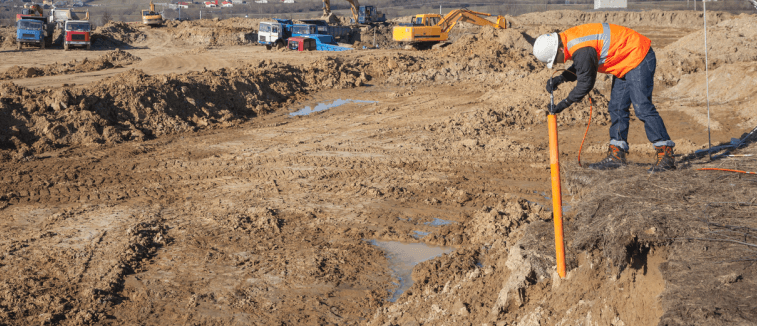Top Guidelines Of Geotheta
Top Guidelines Of Geotheta
Blog Article
Geotheta Fundamentals Explained
Table of ContentsGetting The Geotheta To WorkIndicators on Geotheta You Need To KnowThe smart Trick of Geotheta That Nobody is Talking AboutThe Ultimate Guide To GeothetaOur Geotheta Diaries

They carry out website investigations, gather examples, do lab tests, and evaluate information to examine the viability of the ground for building tasks - Geo Tech Engineer. Based upon their findings, geotechnical engineers offer recommendations for foundation design, slope security, preserving frameworks, and mitigation of geotechnical hazards. They team up with various other experts, such as designers, structural designers, and building and construction teams, to guarantee that geotechnical considerations are integrated right into the general task layout and application
By assessing the habits and properties of soil and rock, they can recognize prospective geotechnical threats such as landslides, dirt settlement, or incline instability. Their expertise helps protect against failings or mishaps that can jeopardize lives and home. Below are some thorough duties and obligations of a geotechnical engineer: Site Examination: Geotechnical engineers conduct website investigations to gather data on subsurface problems.
They interpret the information to comprehend the residential or commercial properties and habits of the dirt and rock, including their toughness, permeability, compaction features, and groundwater conditions. Geotechnical Analysis and Layout: Geotechnical engineers analyze the information accumulated during website examinations to evaluate the stability and suitability of the site for construction projects. They execute geotechnical calculations and modeling to review variables such as bearing capacity, negotiation, slope security, lateral earth stress, and groundwater flow.
See This Report about Geotheta
Structure Design: Geotechnical designers play a critical duty in developing foundations that can safely sustain the intended framework. They analyze the soil problems and lots demands to determine the ideal foundation type, such as shallow foundations (e.g., grounds), deep structures (e.g (https://medium.com/@ianhammond2191/about)., stacks), or specialized strategies like dirt enhancement. They take into consideration aspects such as settlement limitations, bearing ability, and soil-structure interaction to establish optimum foundation layouts
They review building plans, display website activities, and carry out field examinations to verify that the design referrals are complied with. If unforeseen geotechnical issues develop, they examine the situation and provide referrals for remediation or adjustments to the style. Threat Analysis and Reduction: Geotechnical engineers assess geotechnical dangers and risks connected with the project site, such as landslides, liquefaction, or soil disintegration.

Partnership and Interaction: Geotechnical designers work closely with various other professionals associated with a task, such as designers, structural engineers, and construction groups. Reliable communication and collaboration are important to incorporate geotechnical considerations into the total job layout and building and construction procedure. Geotechnical designers offer technological experience, answer inquiries, and guarantee that geotechnical demands are fulfilled.
How Geotheta can Save You Time, Stress, and Money.
Right here are some kinds of geotechnical designers: Foundation Designer: Structure designers specialize in developing and examining foundations for structures. They evaluate the dirt problems, lots demands, and site characteristics to establish one of the most appropriate foundation type and layout, such as shallow foundations, deep structures, or specialized strategies like stack foundations.
They review the factors affecting incline security, such as soil buildings, groundwater problems, and incline geometry, and establish strategies to stop slope failures and mitigate threats. Quake Engineer: Earthquake engineers focus on examining and developing frameworks to stand up to seismic pressures. They evaluate the seismic hazard of a site, review dirt liquefaction capacity, and establish seismic style standards to guarantee the safety and strength of structures during quakes.
They execute area testing, collect samples, and examine the accumulated data to characterize the dirt properties, geologic developments, and groundwater conditions at a website. Geotechnical Instrumentation Designer: Geotechnical instrumentation engineers focus on tracking and measuring the actions of dirt, rock, and structures. They set up and preserve instrumentation systems that check aspects such as soil settlement, groundwater degrees, slope motions, and architectural variations to assess efficiency and provide very early warnings of potential concerns.
Some Known Questions About Geotheta.
They conduct examinations such as triaxial examinations, debt consolidation tests, direct shear tests, and leaks in the structure examinations to collect data for geotechnical evaluation and design. Geosynthetics Designer: Geosynthetics designers concentrate on the design and application of geosynthetic materials, such as geotextiles, geogrids, and geomembranes. They utilize these products to boost soil stability, reinforce inclines, provide drainage remedies, and control erosion.
They tend to be investigatory individuals, which implies they're intellectual, reflective, and curious. They wonder, systematic, reasonable, analytical, and sensible. Several of them are likewise social, suggesting they're kind, charitable, cooperative, individual, caring, valuable, understanding, tactful, and pleasant. Does this seem like you? Take our totally free job test to find out if geotechnical engineer is among your leading job matches.
In the workplace environment, geotechnical engineers utilize specialized software tools to perform estimations, create designs, and evaluate data. They prepare records, evaluation project requirements, communicate with clients and team members, and coordinate project activities. The office setup offers a helpful setting for study, evaluation, and partnership with various other professionals included in the project.
What Does Geotheta Do?
They often visit task sites to perform site examinations, examine geotechnical conditions, and collect data for evaluation. These gos to entail traveling to different locations, in some cases in remote or difficult terrains. Geotechnical designers might execute dirt tasting, conduct tests, and monitor building tasks to guarantee that the geotechnical facets of the project are being applied correctly.
Geotechnical designers additionally function in specialized geotechnical laboratories. In these facilities, they carry out experiments, carry out examinations on soil and rock examples, and analyze the design properties of the materials. Geotechnical lab designers function thoroughly in these atmospheres, managing screening equipment, operating tools, and recording information. They work together with other research laboratory team to guarantee exact and reliable testing results.
Report this page